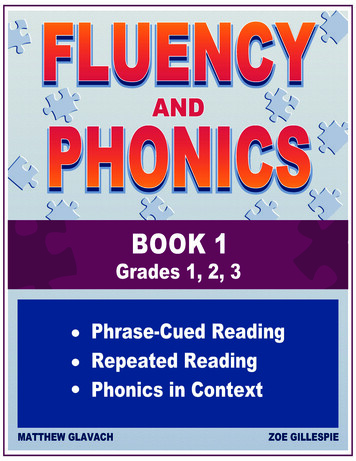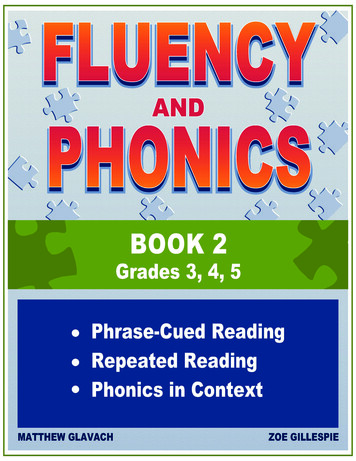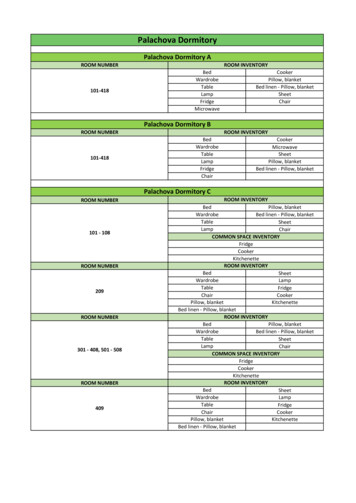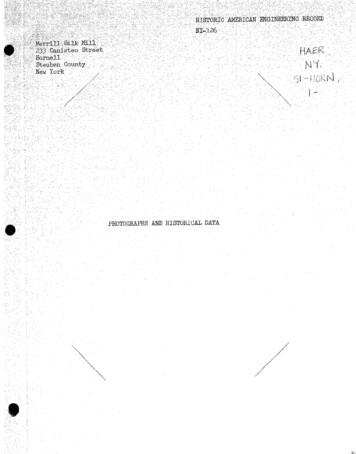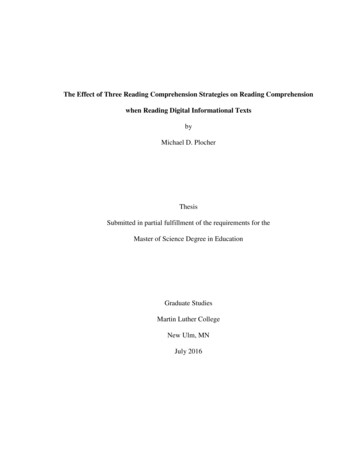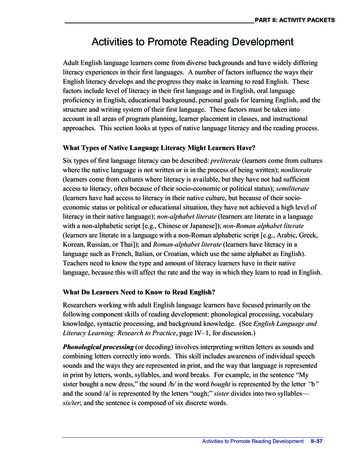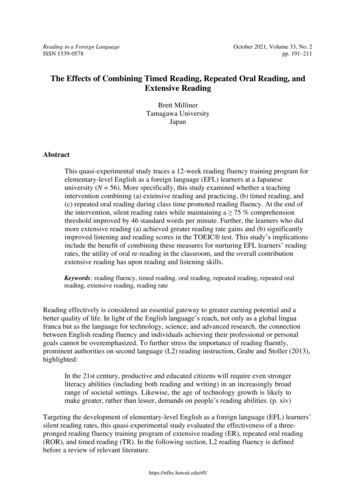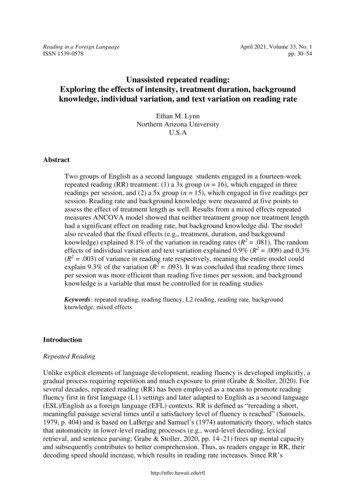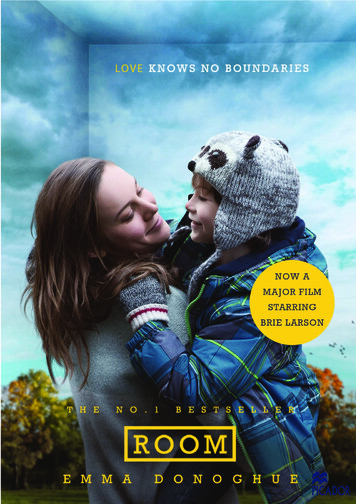
Transcription
LOVEKNOWS NOBOUNDARIESROOMA LETTER FROM THE AUTHORREADING NOTESRECOMMENDED TEXTS
ROOMLOVEKNOWS NOBOUNDARIESToday I’m five. I was four last night going to sleep in Wardrobe, but when I wake up in Bed inthe dark I’m changed to five, abracadabra.Jack lives with his Ma in Room. Room has a single locked door and a skylight, and it measuresten feet by ten feet. Jack loves watching TV but he knows that nothing he sees on the screenis truly real - only him, Ma and the things in Room. Until the day Ma admits there is a worldoutside.Devastating yet uplifting, Room by Emma Donoghue is a luminous portrait of a boundlessmaternal love. It has sold more than two million copies, was a number one bestseller and wasshortlisted for the Man Booker and Orange prizes. Few books have reached modern classicstatus so swiftly.“Room is a book to read in one sitting. When it’s over you look up: the world looks the samebut you are somehow different and that feeling lingers for days” Audrey Niffenegger“One of the most profoundly affecting books I’ve read in a long time” John Boyne“Such incredible imagination, and dazzling use of language . . . Room is unlike anything I’veever read before” Anita Shreve“Room is that rarest of entities, an entirely original work of art. I mean it as the highestpossible praise when I tell you that I can’t compare it to any other book. Suffice to say that it’spotent, darkly beautiful, and revelatory” Michael Cunningham
A LETTER FROM THE AUTHORLOVEKNOWS NOBOUNDARIESAlthough I have often been inspired by real events from previous centuries, this is the firsttime I’ve ever felt compelled to tackle a subject from today’s headlines. I was taken overby the idea of a child born into captivity, and raised in secret isolation in the middle of acontemporary city, with everything he needs except one of the biggest things – freedom. Itstruck me as one of those weird situations which can illuminate the human condition: Jackand Ma’s story might turn out to be, in some sense, everybody’s story.I suppose the theme drew me irresistibly because I have two small children (a son who wasfour when I began Room in April 2008, and a daughter who was one). In my experience, thebond between mother and newborn is a tiny, cosy world which gradually relaxes its magicto let the rest of the world in. But motherhood – even under ideal circumstances – also haselements of nightmare as well as fairy tale, sci-fi as well as realism: it’s a trip like no other, andit can occasionally feel (let’s admit it, shall we, mothers of the world?) like a locked room. Andso can childhood, as I recall: kids are stuck with the parents they get, just as we are stuck withthem. So I suppose I wanted to explore the most bizarre of parent–child situations as a way ofshedding a new light on that most everyday, banal experience of raising kids.Our culture is constantly telling stories about psychos who capture women. I deliberatelykept mine out of the spotlight. The more I read and thought about it, the more it seemed tome that there is no comfortably fixed moral distance between a kidnapper and the rest of us.(The existence of entire slave-owning societies reminded me that humans often find it bothconvenient and pleasurable to own each other.) It was not Old Nick’s evil that fascinated me,but the resilience of Ma and Jack: the nitty-gritties of their survival, their trick of more-or-lessthriving under apparently unbearable conditions.Room is a book about the smallest of worlds, and the biggest. Small ones (such as couples,families, workplaces) have their pleasures as well as their irritations; big ones (cities,nations,the Internet) both attract and alienate. Some days we all feel trapped in our particularlife circumstances, and other days we find there’s more freedom inside their limits, and roominside our heads, than we ever knew.Strange as it might seem, I found that writing historical fiction was the ideal preparation forRoom. I decided that, as much as any medieval peasant or eighteenth-century prostitute,Jack should take his peculiar environment for granted. The main difference was that thistime I did my research not in archives and libraries but almost entirely online. That madethe research pretty visceral – videos of dungeons on YouTube – and also gave it a momentby-moment, one-headline-followed- by-the-next quality: sad stories gathering a few moredreadful details every day, until they fade from the public view. Many of my sources were not‘expert opinions’ but the raw reactions of people all over the world who rush onto messageboards. Listening in gave me insight into what such cases mean to those who hear aboutthem: how they trigger empathy as well as voyeurism, judgment as well as revulsion.
A LETTER FROM THE AUTHORLOVEKNOWS NOBOUNDARIESIn the first week I kept bursting into tears, eyes locked in horror on my screen. The story ofJack and Ma is really not that bad compared with many I read; there are cases of childrenneglected, starved or tortured over long periods, often by their own parents or guardians,that I try not to think about any more because they make me shake.I forced myself to study the details of many cases of kidnapping-for-sexual-purposes from allover the world. I flinched through every website I could find about children raised in limitedor abusive settings – those who are left stunted, and others who are granted miraculoushappy endings. I read about mothers and babies in prisons today and in Nazi concentrationcamps; about unassisted birth and children conceived by rape.Not all my research was the kind that made me shudder. I drew on the different childrearingexperiences of my friends, for instance, one of whom breastfed her child till five. Just as forprevious novels I have put together a mini-dictionary of how people spoke in 1788 or 1864,this time I made myself a dictionary of my son’s kid-English, then narrowed it down to someclassic errors and grammatical oddities that would not seriously confuse readers.I looked uppop hits of the early 2000s to find out what songs would be lingering in Ma’s head. I checkedout police slang, sexual-assault evidence-collection guidelines, the protocols of expensivepsychiatric clinics and treatments for post-traumatic stress disorder.I found inspiration in some great novels of parents and children in extremis, from We Needto Talk About Kevin to The Road, as well as fables of strangers moving between differentsocieties, from Gulliver’s Travels to Robinson Crusoe to Brave New World. I picked mybrother-in-law’s brains on the matter of how Old Nick could have created a secure prison froma garden shed, and I designed Room itself on a home-decor website.Does that sound flippant? My characters taught me that you get your laughs where you can.Jack’s magpie spirit – his scavenging of facts, fantasies and sensory stimuli – infected me,and so did his sense of humour. Children are passionate but unsentimental in dealing withwhatever life is handed to them, so I tried to be too. I drafted Room in six months; this is theeasiest book I have ever written, because I knew what I wanted it to be.Emma Donoghue
READING NOTESLOVEKNOWS NOBOUNDARIES1.Why do you think the entire book is told in Jack’s voice? Do you think it is effective?2.How would the story be different it if were told in Ma’s voice?3.If you were Ma, would you tell Jack about Outside from the start?4.How would you explain Outside to him? Are there things about Outside that youwould not tell him about?5.How is the relationship between Ma and Jack threatened by the Outside World?6.Does Jack benefit at all from his time in Room? Are there any positives for Ma?7.Why are we so fascinated by stories of long-term confinement?8.What were you most affected by in the novel?
RECOMMENDED TEXTSLOVEKNOWS NOBOUNDARIESDaniel Defoe, Robinson Crusoe (1719)Jonathan Swift, Gulliver’s Travels (1726)Elizabeth Barrett Browning, Aurora Leigh (1856)Aldous Huxley, Brave New World (1932)Anne Frank, Diary (first published in Dutch, 1947)Albie Sachs, The Jail Diary of Albie Sachs (1966)V. C. Andrews, Flowers in the Attic (1979)Jean-Dominique Bauby, The Diving Bell and the Butterfly (first published in French, 1997)Alice Sebold, The Lovely Bones (2002)Michael Frayn, Spies (2002)Mark Haddon, The Curious Incident of the Dog in the Night-Time (2003)Lionel Shriver, We Need to Talk About Kevin (2003)Susan Shaw, The Boy from the Basement (2004)Frank Cottrell Boyce, Millions (2004)Jonathan Safran Foer, Extremely Loud and Incredibly Close (2005)John Boyne, The Boy in the Striped Pyjamas (2006)Nancy Huston, Fault Lines (first published in French, 2006)Cormac McCarthy, The Road (2006)Barbara Gowdy, Helpless (2007)Keith Donohue, The Stolen Child (2007)
Jean-Dominique Bauby, The Diving Bell and the Butterfly (first published in French, 1997) Alice Sebold, The Lovely Bones (2002) Michael Frayn, Spies (2002) Mark Haddon, The Curious Incident of the Dog in the Night-Time (2003) Lionel Shriver, We Need to Talk About Kevin (2003) Susan Shaw,
